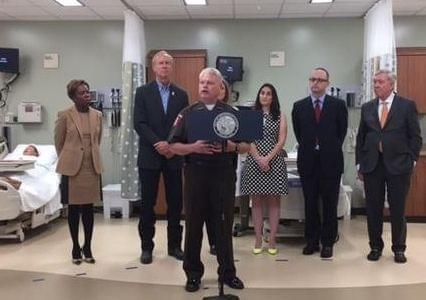Minding The Mental Health Gap

Sangamon County Sheriff Wes Barr joins Gov. Bruce Rauner, state agency directors and behavioral health advocates in promoting Illinois' attempt to expand services available to Medicaid recipients. Amanda Vinicky / WUIS
Mental health centers were decimated during Illinois’ extended budget stalemate. Illinois is moving forward with plan to extend and expand behavioral health services to people who couldn't otherwise afford it, in a way that officials say will be cost-neutral to taxpayers.
Dr. Cari Wolf says Illinois is roughly where Texas used to be.
“It was common to have people experiencing a mental health crisis languish in ERs for days. Law enforcement spent hours responding to mental health crises and trying desperately to link people with services. Primary care physicians were often missing the subtle onset of mental health symptoms," she said.
Then, Wolf says, Texas got permission from the federal government to change how the state runs Medicaid, the public health-care program for the poor.
Wolf says doctors began screening for depression and substance abuse; they were linked to telepsychiatry programs; there were services for kids in schools.
Now, Wolf is the Chair of Psychiatry at the Southern Illinois University medical school in Springfield. She supports Illinois’ attempt to do something similar.
Illinois has its application in; if what's known as a 1115 Medicaid waiver is granted, the goal is to link Medicaid recipients’ physical and behavioral healthcare starting in July.
The state wants to use $2.7 billion in Medicaid funding on programs like supportive housing, helping prison inmates transition to society, and early childhood mental health screening, to coordinate between agencies, and moving patients from institutional to community care settings.
Sangamon County Sheriff Wes Barr likewise has high hopes. He many inmates in the local jail have mental health issues, substance abuse problems or both.
He says Sangamon County is holding at least three prisoners who are waiting for space at a state mental health facility, and he expects that sometime this month another inmate will be found unfit to stand trial.
“We’ve had to hold these people, at the order of court, for over a month before a mental health facility bed is available," he said. "This creates a dangerous situation. It’s a dangerous situation for the inmates, it’s also a dangerous situation for our staff. Out staff members have been injured by these inmates because they are not receiving the treatment they need.”
Barr is on board with Illinois’ plan to take a more comprehensive approach with Medicaid, the public healthcare program for low-income individuals.
The state has to get permission from the federal government. It wants to use Medicaid funding on programs like supportive housing, helping prison inmates transition to society, and early childhood mental health screening.
Barr says with inmates who qualify for Medicaid, this would help get them out of jails and into treatment programs where they belong.

